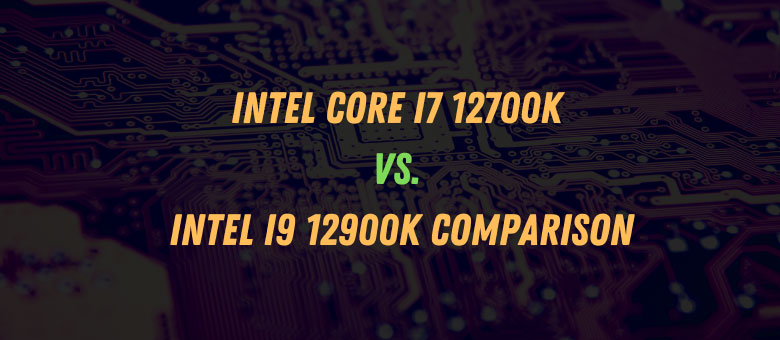Intel Core i7 12700K Vs. Intel i9 12900K Comparison

Two great additions to the Intel 12th gen Alder Lake family, two powerful processors, two CPUs packed with features that will elevate your performance, gaming experience, and productivity – so which one is best for your purposes?
Features, architectures, and applications are the core deciding factors for which CPU is right for you. These two offerings by Intel have many similarities and many differences in these aspects. Hopefully, this exploration will give you the tools to make the right decision.
Let’s take a look at the building blocks of both these processing units.
Intel Core i7 12700K Vs. Intel i9 12900K
1. Architecture
Architecture is very important when deciding which CPU is better suited to your applications. The Intel i7-12700k and the Intel i9-12900k run the proprietary Intel 12th gen architecture, where cores are split into performance cores (P-cores) and efficiency cores (E-cores). And the performance cores are hyper-threaded (supporting two process threads per core), whereas efficiency cores are single-threaded.
In this format, the i7-12700k offers 8 P-cores + 4 E-cores, offering 20 process threads.
The i9-12900k has slightly more features in this set. It provides 8 P-cores + 8 E-cores, offering 24 process threads.
So we see that both these CPUs will do a superb job in terms of multitasking. The P-core offering for both is the same, which means the heavy lifting will likely yield similar results.
However, there is no winner necessarily here; the offering you choose should depend on utilizing these process threads. It brings us to the performance of the cores.
2. Core performance
Both gaming and productivity-intensive applications require your CPU to be pushed to maximum performance. Since these are the CPUs under consideration, an essential factor is the clock speeds. It determines the ability of the CPU to process instructions.
The Intel i7-12700k offers its P-cores at a base clock speed of 3.6 GHz and overclockable to 5.0 GHz. In contrast, the E-cores are at a base speed of 2.7 GHz and overclockable to 3.8 GHz. And this processor comes with 25MB of L3 cache.
The i9-12900k takes this a bit further with P-cores at a base clock speed of 3.2 GHz and overclockable to 5.2 GHz. The E-cores are at a base speed of 2.4 GHz and overclockable to 3.9 GHz. And it has 30MB of L3 cache.
You will see that the i9-12900k base ratings are lower. However, it is extremely rare to see the cores running at the base rating clock speeds anyway.
Here, there is a clear advantage to the Intel i9-12900k. This processor allows your machine to run heavy applications with lots of processing that will frequently require overclocking your CPU to the maximum.
However, if you want to do casual gaming or run most productivity applications, the i7-12700k will suffice.
3. RAM compatibility
For users interested in multitasking-heavy applications, the type of RAM supported by the processor becomes an essential factor. In this case, there is a clear winner.
The i7-12700k supports DDR4 RAM, whereas the i9-12900k supports DDR4 and the faster, more efficient DDR5 RAM architecture. Hence, this is a crucial distinction, as there is absolutely no doubt that the DDR5 architecture is the better one.
But this alone should not be a deciding factor, as the inclusion of DDR5 support means the extra cost that comes with a motherboard compatible with DDR5 and the increased cost of DDR5 RAM. You must read this guide on the best motherboard for i9 12900K before picking any mobo.
4. Cooling provision
In this case, both units are evenly placed, with neither coming with a bundled cooler. Overall, this is a good thing, as the stock cooler would probably have not sufficed for the power generated by these processing units. Thereby, it ensures some extra cost-saving.
5. Pricing
Realistically, pricing is one of the essential factors in deciding which processing unit to commit to for your next build.
In this case, pricing is probably the most significant difference between these two units.
The Intel i7-12700k sits in the upper midrange of the Intel 12th Gen Alder Lake family at around USD 409.
The Intel i9-12900k is a premium offering from the same family, priced at around USD 589.
However, there is an additional hidden cost to the Intel i9-12900k. Given its higher performance, the cooling solution will need more investment. Given the DDR5 support, the motherboard adds the price to ensure compatibility.
Conclusion
In terms of pure feature deck and maximum performance, there is no doubt that the premium offering, the Intel i9-12900k, beats its counterpart in every way.
Anyway, the question is, do you need the extra 200GHz of overclocking power, the 4 additional process threads, and the DDR5?
Suppose you are a heavy gamer with streaming needs, or you work with multi-processing high-end applications and need to draw high amounts of power regularly. In that case, the Intel i9-12900k is absolutely a suitable investment for you, as you will get your money’s worth in terms of the extra cost.
And suppose you require an all-around high-performance machine that gets the job done efficiently for games, productivity, and multitasking without extreme processing. In that case, the Intel i7-12700k is the better choice, saving on cost for what is undoubtedly still exceptional performance.

Hi, thanks for comparing these latest two CPUs. I have decided to buy an I9 12900K. Can you please suggest some good motherboards for that? Should go with Z690 mobo or others.
Sure, Nathan, I would love to share my thought. For i9 12900K you should go for Z690 motherboard. Because I am assuming that you are picking i9 for high-performance. For that you need a motherboard which can deliver power smoothly. I can tell some mobo such as Asus Rog Strix Z690-E,Gigabyte Z690 Aorus Master. For more make sure to check this https://www.guildcafe.com/best-motherboard-for-i9-12900k.html
and also check this list of z690 mothboard guide… https://www.guildcafe.com/best-z690-motherboard.html